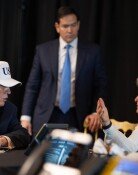KCC crisis fueled by political reasons
KCC crisis fueled by political reasons
Posted July. 27, 2024 07:15,
Updated July. 27, 2024 07:15
President Yoon Suk Yeol has approved the dismissal of Lee Sang-in, the acting chairman and vice-chairman of the Korea Communications Commission (KCC). Lee's preemptive resignation came in response to the Democratic Party's sudden impeachment proposal, aimed at preventing the replacement of MBC management aligned with the opposition. This has resulted in an unprecedented situation: the KCC, which typically operates with five standing commission members, including a minister-level chairman, now has none. The government plans to swiftly appoint new standing members and proceed with the personnel hearing for chairman nominee Lee Jin-sook, aiming to restore the KCC to a two-member system and move forward with the MBC board's replacement.
This turmoil marks the third consecutive impeachment attempt following Chairmen Lee Dong-kwan and Kim Hong-il. Never before in our constitutional history has an acting chairman faced impeachment. Since August last year, three standing commission positions recommended by the National Assembly have remained vacant due to political infighting. This deadlock has left the KCC operating with only the minimum quorum of two presidential appointees, creating a fragile situation where the departure of even one member halts its functions. This has led to a vicious cycle of impeachment proposals, resignations, and reappointments. Over the past 14 months, the KCC leadership has changed seven times, including acting chairpersons, leaving the commission paralyzed.
As the deadline for replacing public broadcaster board members approaches, the struggle for control between the ruling and opposition parties has intensified. The opposition has been pushing for amendments to the Broadcasting Three Laws, which would affect the composition of the KBS, MBC, and EBS boards. In response, the ruling People Power Party has launched a filibuster, accusing the opposition of attempting to permanently dominate public broadcasting. The personnel hearing for Lee Jin-sook, lasting three days—the longest in ministerial hearing history—has left doubts about the thoroughness of the vetting process. The opposition's focus on moral and policy competency was overshadowed by personal attacks, while the ruling party hastily defended the nominee despite numerous controversies.
The government appears determined to appoint Lee Jin-sook regardless of whether the National Assembly adopts the personnel hearing report. At the same time, the opposition plans to propose an impeachment bill immediately upon her inauguration. The ruling party intends to request a presidential veto if the Broadcasting Four Laws are passed. This political showdown has paralyzed the essential functions of broadcasting and telecommunications regulation. Tricks and counter-tricks will only perpetuate this cycle. The ruling and opposition parties must urgently recommend and appoint standing commission candidates to normalize the KCC's operations. Moving beyond this deadlock and restoring functionality to the KCC is imperative, ensuring it can effectively oversee the vital sectors of broadcasting and telecommunications.







